Cambridge-IFLP
3rd Cambridge Islamic Finance Leadership Programme Address Leadership Cap In The Global Islamic Financial Service Industry
The steady progress from niche to mainstream indicates the strong demand for Islamic financial instruments at the global level. With further internationalisation of the industry, the need for highly skilled staff is a significant challenge as the lack of qualified talent can impede the industry’s growth. What is more worrying is the widening leadership gap that threatens the sustainability of the global Islamic financial services industry.

Recognising the critical need to address leadership gap that is prevalent in the industry, Cambridge IF Analytica launched its Islamic Finance Leadership Programme (IFLP) with the first programme held in 2013. “The objective of this programme
is to nurture the right type of talent for the industry that is clearly facing shortage of high-quality human resources especially at the top and senior management levels,” said Dr Sofiza Azmi, CEO of Cambridge IF Analytica and Programme Director. “Through our annual leadership programme, we hope to close the ever-widening leadership gap that continues to persist in the global Islamic financial industry”, she added.
“The leadership programme aims to prepare the next generation of leaders by providing them with a unique mentoring opportunities, rigorous leadership training from renowned leaders as well as industry-specific case studies in Islamic finance,” explained Professor Humayon Dar, Founder of Cambridge IFLP and Chairman of Edbiz Corporation.
This summer, Cambridge IF Analytica successful completed its 3rd edition of Cambridge Islamic Finance Leadership Programme (“Cambridge-IFLP”), which was held from August 13-18, 2017, at Clare College, a member of the University of Cambridge syndicate. Founded in 1326, Clare College is the second oldest college at the University of Cambridge. Cambridge-IFLP enjoys the reputation of being the first and the only global leadership programme specifically structured for middle and upper-middle management personnel of Islamic financial institutions. Designed and structured by Cambridge IF Analytica, the programme is delivered by some of the most influential leaders in Islamic banking and finance. A total of 50 delegates, speakers and mentors from 15 countries from the US, Europe, Middle East and Asia participated in the 5-day residential programme. The Programme includes Leadership Interviews, Leadership Activities, Leadership Talks, Leadership Walk and Case Study.
Notable mentors and speakers included Iqbal Khan (CEO of Fajr Capital), Iyad Asali (General Manager of Islamic International Arab Bank, Jordan), Mohamed Amersi (Chairman and Founder of a number of telecom companies and a pioneering personality in Islamic legal documentation) Rafe Haneef (CEO of CIMB Islamic Bank), Stella Cox (CEO of DDCAP, UK), Dato’ Izani Ghani (Executive Director of Khazanah Nasional Berhad), Dr. Hamed Meerah (Secretary General of Accounting & Auditing Organisation for Islamic Financial Institutions, Bahrain), Dr. Zahid Parvez (Principle of Markfield Institute of Higher Education, UK), Professor Mehmet Bulut (Vice Chancellor of Istanbul Sabahattin Zaim University, Turkey), Professor Mehmet Asutay (Professor of Islamic Political Economy at Durham University Business School), and Dato’s Dr Mohd Daud Bakar (Chairman of Amanie Advisors).
Islamic finance resonates clearly with the 2030 Agenda and unleashing its potential is an opportunity for sustainable development that cannot be missed.
– Rafe Haneef
The Cambridge-IFLP is uniquely designed to expose participating middle and upper-middle management personnel of Islamic financial institutions to well-established Islamic banking and finance leaders. Hence, the pedagogical methodology applied to the Programme gives priority to real-time leadership perspectives, implicitly assuming that leadership is more like an art rather than a science. “We believe that leadership can best be understood by studying and closely observing the leaders themselves. Hence, our programme has been designed to allow our delegates to benefit from the presence of a number of mentors who are leading personalities in the global Islamic financial services industry,” said Dr. Sofiza Azmi. “Leadership workshop, along with interactive social activities and Leadership Activities, allow the delegates to seek mentorships and develop relationships with these leaders as delegates will be able to interact with them formally and informally.”
The 3rd Cambridge-IFLP was
A STAR-STUDDED PROGRAMME,
with CEOs of Islamic financial institutions and Shari’a scholars serving as mentors. “We studied all the top executive and leadership programme offered by the top universities in the world, and concluded that the existing programmes are too academic and principally taught by professors who may not have sufficient practical knowledge and understanding of organisational-level issues,” said Dr Sofiza Azmi, Programme Director of Cambridge-IFLP. “Ours is a leadership programme with an exclusive focus on practice, led by practitioners,” she continued.
For this year’s programme, Cambridge-IFLP included 8 Leadership Interviews, 7 Leadership Talks, 3 Leadership Dialogue, 2 Leadership Workshops and 3 Leadership Activities. Leadership Interviews provided great first-hand insights into leadership values, philosophies and qualities as well as an opportunity for delegates to flesh out questions to the leaders themselves. When asked to identify key values that a leader needs to have; Iyad Asali stressed on integrity, and satisfying all stakeholders including staff, clients, owners and Allah swt. He also emphasised on safeguarding the interest of all stakeholders as goal of a sustainable business.
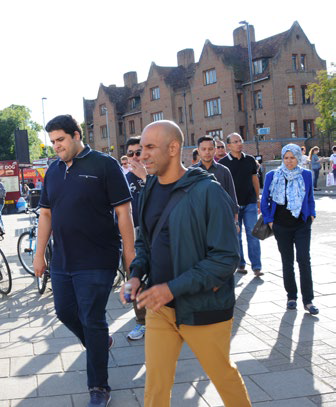
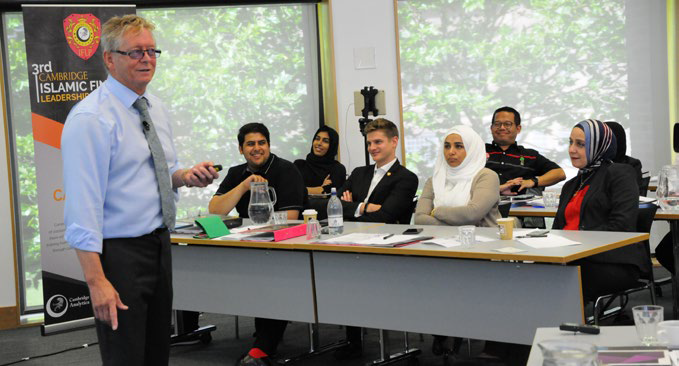
Khazanah Nasional continues to play a leading role in the development of Islamic finance, especially in sukuk issuance where it continues to pioneer world’s first and most innovative sukuk issuances and structures. Dato’ Izani Ghani shared his leadership journey at Khazanah and Khazanah’s role as a catalyst for Islamic finance. Dr Hamed Hassan Merah shared his leadership role at AAOIFI and the leadership role of AAOIFI in setting international standards for the global Islamic finance industry.
With a number of Leadership Talks given by industry leaders, the delegates benefitted from in-depth knowledge and understanding from industry experts on how to develop themselves into effective and influential leaders in their respective organisations and in the global Islamic financial services industry. “It is always a treat to listen to the likes of Iqbal Khan whose inspiring concluding speech at the 2017 Cambridge-IFLP was the perfect closing of the programme,” said Professor Humayon Dar. Leadership Talks covered wide range of topics and perspectives including structuring and product development, human resource development, and leadership perspectives.
Professor Mehmet Asutay highlighted the need for Islamic finance industry to innovate by developing new products but at the same time “doing things differently”; for which he stressed that “transformational leadership must be the model for the development of leadership for the sustainability of Islamic finance industry.” His leadership talk centred around the need for transformational leadership through knowledge creation for the sustained development of Islamic finance. Thus, for the innovative nature of the industry, the industry needs to develop new generation of leaders who can ‘flow without blurring and freezing’ by saying and by conducting new practices and institutions. Professor Asutay went on to explain that “the development of leadership for the industry is only possible through research as well as action-based policy research.” He added that “education of the new generation of Islamic financiers should be beyond theorizing the experience of the banks but developing new capacities through research.”
Rafe Haneef shared his views on the future of Islamic finance for which he stressed on the need for the industry to progress from “what is permissible” to “what is sustainable”. The core principles of Islamic finance are the main tenets of the 2030 Agenda for Sustainable Development and are similar to those of impact investment: inclusiveness, equitable and participatory growth, social and distributive justice, open and accountable institutions, sustainability and women’s empowerment. “Since Islamic finance resonates clearly with the 2030 Agenda and unleashing its potential is an opportunity for sustainable development that cannot be missed,” said Rafe Haneef. “However, at present, Muslims neither lead nor actively participate in global sustainability standards,” he added. Although the principles of Islamic finance require promotion of environmental and social goals, the industry has not contributed to these factors significantly. Moving forward, Islamic financial institutions need to change their orientation by incorporating ESG factors in the broader concept of Shari’a compliance as a key business driver.
IFLP Collage
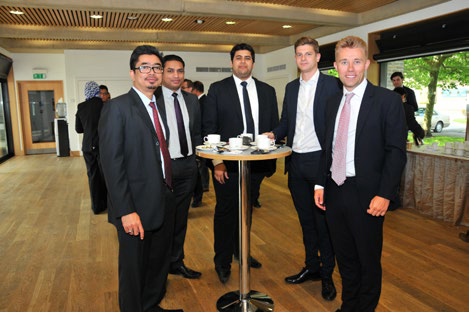


waiting for the whole
grilled lamb to arrive

Leadership Speech

Islamic Leadership
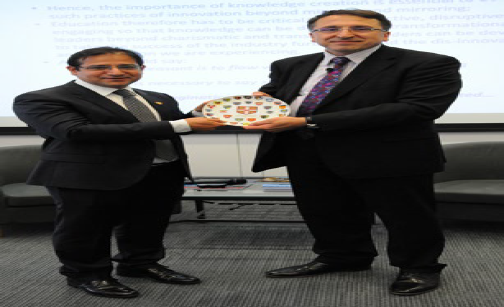
token to Professor Mehmet Asutay

Hall of Fame
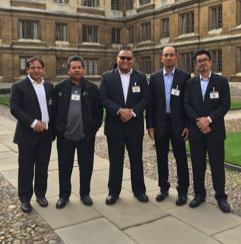
at Old Court, Clare College

Talking on the subject of “Islamic Leadership in a Globalised World”, Dr Zahid Parvez said that living through a period of unprecedented and transformative change requires new visions for leaders to be successful and greater ability to adapt due to continuous change. This involves adopting new approaches, acquiring new skills and new tools as changing environments will demand new and changing organisational structures (ways of organising) and new ways of leading. Hence, three leadership competencies are required for future leaders include leading self, leading people and leading the organization.
Dr Parvez also explained the fundamental differences between conventional leadership and Islamic leadership. Whilst the orientation of conventional leadership is premised on material success, relativism and duniya (short term), Islamic leadership according to Dr Parvez “achieve goals through God oriented (seeking pleasure of God), value and principle oriented (universal) and akhirah oriented, i.e. maximisation of long-term benefits by considering implications of present actions on long-term benefits such sustainability, justice, human well-being. Hence, Islamic leadership places greater emphasis on soft factors such beliefs and values; knowledge and insights that provide foresight and wisdom (hikmah); and personal abilities and competencies. He explained that belief and values include iman (vision and conviction), niyyah (motivation and drive), taqwah (conscious of moral behaviour/ conduct), shura (considering issues from multiple perspective), tawakkal (confidence, courage, trust in Allah that enables sabr and sacrifice) and muhasibah (evaluation, learning from doing, accountability).
Datuk Dr Mohd Daud Bakar shared some interesting insights into leadership lessons from Emirates Airline Sukuk, which is based on his award-winning book titled “Emirates Airline Sukuk”. He presented 10 critical points of leadership which amongst them are ‘think and do big for a better impact’, ‘make necessary connection to the ecosystem’, ‘have big picture mentality’, ‘lead by sharing not by imposing’ and ‘engage with new and relevant stakeholders’.
The Keynote Leadership Speech by Iqbal Khan was inspirational as well as motivational. He highlighted the visionary work of the Islamic finance industry’s pioneers and discussed the many leadership lessons from their achievements. These include ‘work for your passion, not your pension’; ‘never underestimate the power of dedication, humility, and hard work’ and ‘those who serve others are blessed beyond measure’. He concluded that although industry pioneers had many unique characteristics, they collectively shared an important vision and objective, which is to create, sustain, and advance values-based and impact-focused industry institutions.
A network of high-level PROFESSIONALS

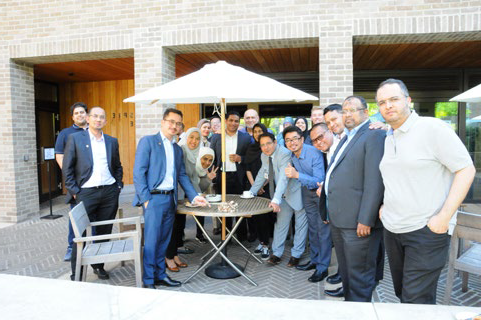
He further added that “Islamic finance industry has been fuelled by pioneering institutions and industry-building organisations – many of whom continue to drive the industry forward.” Some of the pioneering institutions he referred to were Khazanah Nasional, IRTI, Kuwait Finance House, IFSB and Durhan University. Iqbal Khan stressed that “these industry institutions act as the glue that holds the wall and wallpaper together. We need to learn from our successful institutions and build on their achievements.” Some of the lessons presented were:
• Democratise knowledge, and create industry-wide graduate trainee programmes for the next generation of leaders
• Create a “brown bag” culture in order to spread light, liberty, and learning across our institutions and industry
• Create enduring value and maximum impact – for shareholders, employees, markets and constituent communities
• Make it easy to do business: Thinking outside the box to innovate, improve service, and ultimately benefit the customer
• Focus on excellence and execution, without compromising on values.

He also pointed out that the Islamic finance industry and its industry institutions have come a long way since its early years. However, the industry still has a long way to go in order to meet the hopes and aspirations of the industry’s pioneers. “How do we progress Islamic finance in authenticity and reach and create a global demonstration effect to drive our industry towards the next stage of its evolution?” put forward by Iqbal Khan. According to him, in order to create a truly global demonstration impact, the Islamic finance industry’s future leaders must focus on building, maintaining, and supporting industry-building institutions. In concluding this speech, he reminded the delegates that although “we cannot influence the things that are not under our control, we can control our very own sphere of influence: salah, good deeds, people whom we touch, dominant thoughts or ideas and people whom we spent the most time with.
During the 5 days at Clare College, delegates took part in several social activities that are a must on the “to do” list when one is visiting the University of Cambridge. This included punting on the River Cam and enjoying one of Shakespeare’s famous play at King’s College garden. Every year, the university holds Cambridge Shakespeare Festival and this year marks the 30th year of the event. During the garden party held at the Scholar’s Garden, delegates had the opportunity to enjoy the British summer weather while at the same time horned their leadership skills during the Cambridge IFLP Treasure Hunt activity organised on the college grounds.
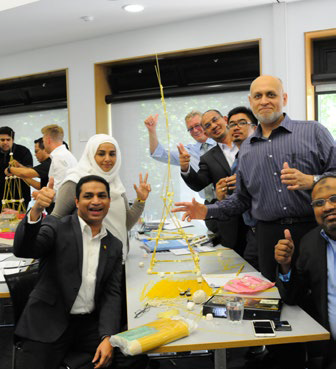
This year, six Cambridge Islamic Finance Leadership Awards were announced. Winners were selected based on their active involvement and participation during the entire programme, the originality of ideas expressed and shared, demonstrated superior leadership qualities in all activities conducted and were of great inspiration and role model to others. The winners included: Saif Hamdan Al Alkeem, Head of Priority Banking for the UAE at Abu Dhabi Islamic Bank (ADIB); M. Farshad Cader, Senior Manager/Head of Financial Institution at Kuwait Finance House (KFH); Muhamad Yusri Wahsalfelah, Deputy Head, Government Relations and Special Projects at Bank Islam Brunei Darussalam (BIBD); Irwan Abdalloh, Head, Islamic Capital Market Development at Indonesia Stock Exchange; Obeid Ruff, Islamic Finance Attorney from USA; and Marina Mardi, Assistant Vice President Finance at Khazanah Nasional Berhad.
These awards were given to outstanding delegates who had demonstrated exceptional leadership qualities during the programme, participated actively and constructively in all discussions, and their inputs added value both to the programme and other delegates. All delegates received their certificates from Dr. Hamed Meerah, Secretary General of AAOIFI, whilst the Cambridge Islamic Finance Leadership Awards were presented by Iqbal Khan of Fjar Capital.
Quotes from the DELEGATES
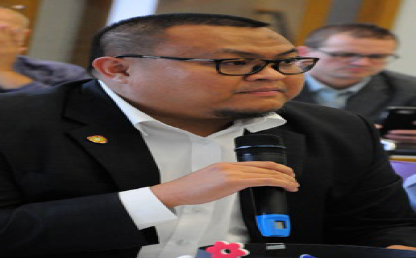
Mohammad Yusri Wahsalfelah
Deputy Head, Government Relations and Special Projects
Bank Islam Brunei Darussalam
“Firstly, I would like to take this opportunity to sincerely thank my institution Bank Islam Brunei Darussalam (BIBD) for giving me the best opportunity to be enrolled in the 3rd Islamic Finance Leadership Programme (IFLP) held at Clare College, University of Cambridge, United Kingdom. IFLP in my humble view is a programme one of its kind of which it brings in successful people, businessmen and visionaries to sit together and share their real-life stories that shaped and changed not only them but also the Muslim as well as the world community as a whole. It is a visionary and forward-looking programme of its kind to well-equip Islamic finance practitioners in the real world.
It is an excellent platform for all participants to exchange thoughts, experiences, pose hard questions and share real issues as well as challenges with the aim for everyone not only to learn but most importantly to gain wisdom towards creating a steady path and opportunities for Islamic finance as a leading, right and crucially blessed platform for businesses to grow further. The programme has successfully achieved its noble cause and has created harmony and fostered strong brother/sisterhood to all participants, speakers as well as volunteers of the programme. This is key as via strong and mutual understanding, cohesiveness as well as good spirit of humanity, all difficulties and challenges can be overcome together.
Finally, I would like to take this opportunity to convey my deepest appreciation to Professor Humayun Dar and Dr Sofiza Azmi of Cambridge IF Analytica for their tireless efforts in promoting Islamic finance as guided way of Muamallah. May Allah S.W.T help and bless them and the entire Muslim ummah towards achieving “Baldatun Tayyibatun Wa Rabbun Ghafur”.
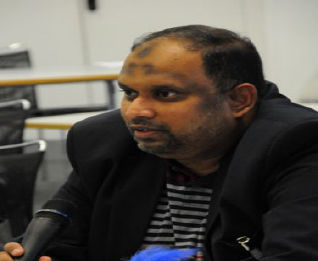
M. Farshad Cader
Kuwait Finance House (KFH)
“The Cambridge IFLP was a phenomenal and unique experience, a must-attend leadership programme for all the budding or aspiring future leaders in the Islamic banking and finance discipline. I, firmly believe that Cambridge IFLP will help to inculcate the Islamic facets of leadership coupled with banking acumen. I was overwhelmed by the choice of speakers, blend of the areas or subjects covered and the great networking opportunity with an audience across the globe. I was truly honoured to be part of IFLP 2017.”

Obeid Ruff
Islamic Finance Attorney and Certified Fraud Examiner, Washington, USA
I had high expectations for this programme, which Cambridge IFLP greatly exceeded. Not only was I able to learn more about industry issues I had questions about, but I was interacting with the literal product developers and compliance advisors on those exact issues! The programme format and the professionals I was able to engage with at Cambridge
IFLP is the best professional educational endeavour I have pursued. While in attendance I collaborated on a PhD project, developed 2 bank products, and joined a network of high-level professionals who I remain in contact with and anticipate will remain life-long friends. This programme is an experience that becomes part of a foundation and networking movement, and delivers far more than a week-long event.”
Quotes from the DELEGATES
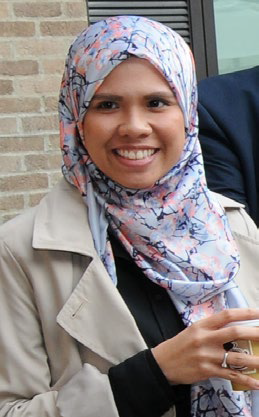
Marina Mardi
Assistant Vice President Finance
Khazanah Nasional Berhad
“The Cambridge IFLP is a good platform to be in the same room with well-established Islamic Finance’s leaders from different backgrounds – this being heads of financial institutions and well-known shariah scholars. They were willing to spare some time from their busy schedule to share their knowledge and experiences with the delegates of IFLP. Delegates were filled with latest updates from Islamic Finance in a very comprehensive discussion mode. With a quality list of delegates, IFLP has step to another level on giving a high standard leadership training with focus on Islamic Finance. From friendly facilitators to casual interaction between delegates and speakers, I personally felt like family with everyone involved in the Programme and I think this is the x-factor of this Programme. Congratulations Cambridge IF Analytica for a thoughtful experience!”



